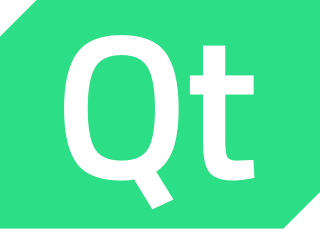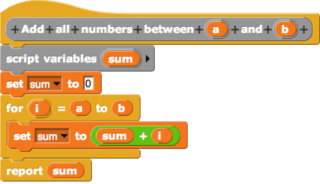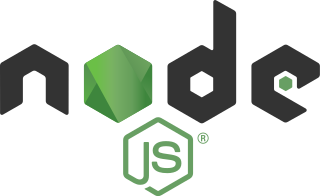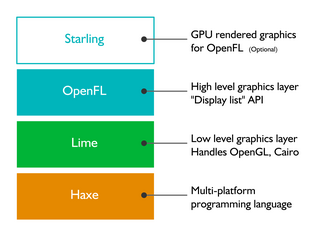Related Research Articles

Qt is cross-platform application development framework for creating graphical user interfaces as well as cross-platform applications that run on various software and hardware platforms such as Linux, Windows, macOS, Android or embedded systems with little or no change in the underlying codebase while still being a native application with native capabilities and speed.

In computing, a visual programming language, also known as diagrammatic programming, graphical programming or block coding, is a programming language that lets users create programs by manipulating program elements graphically rather than by specifying them textually. A VPL allows programming with visual expressions, spatial arrangements of text and graphic symbols, used either as elements of syntax or secondary notation. For example, many VPLs are based on the idea of "boxes and arrows", where boxes or other screen objects are treated as entities, connected by arrows, lines or arcs which represent relations. VPLs are generally the basis of Low-code development platforms.

Apache Flex, formerly Adobe Flex, is a software development kit (SDK) for the development and deployment of cross-platform rich web applications based on the Adobe Flash platform. Initially developed by Macromedia and then acquired by Adobe Systems, Adobe donated Flex to the Apache Software Foundation in 2011 and it was promoted to a top-level project in December 2012.

Wireshark is a free and open-source packet analyzer. It is used for network troubleshooting, analysis, software and communications protocol development, and education. Originally named Ethereal, the project was renamed Wireshark in May 2006 due to trademark issues.
Apache Cordova is a mobile application development framework created by Nitobi. Adobe Systems purchased Nitobi in 2011, rebranded it as PhoneGap, and later released an open-source version of the software called Apache Cordova. Apache Cordova enables software programmers to build hybrid web applications for mobile devices using CSS3, HTML5, and JavaScript, instead of relying on platform-specific APIs like those in Android, iOS, or Windows Phone. It enables the wrapping up of CSS, HTML, and JavaScript code depending on the platform of the device. It extends the features of HTML and JavaScript to work with the device. The resulting applications are hybrid, meaning that they are neither truly native mobile application nor purely Web-based. They are not native because all layout rendering is done via Web views instead of the platform's native UI framework. They are not Web apps because they are packaged as apps for distribution and have access to native device APIs. Mixing native and hybrid code snippets has been possible since version 1.9.

AppScale is a software company offering cloud infrastructure software and services to enterprises, government agencies, contractors, and third-party service providers. The company commercially supports one software product, AppScale ATS, a managed hybrid cloud infrastructure software platform that emulates the core AWS APIs. In 2019, the company ended commercial support for its open-source serverless computing platform AppScale GTS, but AppScale GTS source code remains freely available to the open-source community.
Titanium SDK is an open-source framework that allows the creation of native mobile applications on platforms iOS and Android from a single JavaScript codebase. It is presently developed by non-profit software foundation TiDev, Inc.

Symbian is a discontinued mobile operating system (OS) and computing platform designed for smartphones. It was originally developed as a proprietary software OS for personal digital assistants in 1998 by the Symbian Ltd. consortium. Symbian OS is a descendant of Psion's EPOC, and was released exclusively on ARM processors, although an unreleased x86 port existed. Symbian was used by many major mobile phone brands, like Samsung, Motorola, Sony Ericsson, and above all by Nokia. It was also prevalent in Japan by brands including Fujitsu, Sharp and Mitsubishi. As a pioneer that established the smartphone industry, it was the most popular smartphone OS on a worldwide average until the end of 2010, at a time when smartphones were in limited use, when it was overtaken by iOS and Android. It was notably less popular in North America.

Node.js is a cross-platform, open-source JavaScript runtime environment that can run on Windows, Linux, Unix, macOS, and more. Node.js runs on the V8 JavaScript engine, and executes JavaScript code outside a web browser.
Sauce Labs is an American cloud-hosted, web and mobile application automated testing platform company based in San Francisco, California.
A mobile application or app is a computer program or software application designed to run on a mobile device such as a phone, tablet, or watch. Mobile applications often stand in contrast to desktop applications which are designed to run on desktop computers, and web applications which run in mobile web browsers rather than directly on the mobile device.
Mozilla is a free software community founded in 1998 by members of Netscape. The Mozilla community uses, develops, publishes and supports Mozilla products, thereby promoting exclusively free software and open standards, with only minor exceptions. The community is supported institutionally by the non-profit Mozilla Foundation and its tax-paying subsidiary, the Mozilla Corporation.

F-Droid is an open-source app store and software repository for Android, serving a similar function to the Google Play store. The main repository, hosted by the project, contains only free and open source apps. Applications can be browsed, downloaded and installed from the F-Droid website or client app without the need to register for an account. "Anti-features" such as advertising, user tracking, or dependence on non-free software are flagged in app descriptions.

ZAP, formerly known as OWASP ZAP, is an open-source web application security scanner. It is intended to be used by both those new to application security as well as professional penetration testers.

OpenFL is a free and open-source software framework and platform for the creation of multi-platform applications and video games. OpenFL applications can be written in Haxe, JavaScript, or TypeScript, and may be published as standalone applications for several targets including iOS, Android, HTML5, Windows, macOS, Linux, WebAssembly, Flash, AIR, PlayStation 4, PlayStation 3, PlayStation Vita, Xbox One, Wii U, TiVo, Raspberry Pi, and Node.js.

Ionic is an open-source UI toolkit for building cross-platform mobile, web, and desktop applications using web technologies such as HTML, CSS, and JavaScript/TypeScript. It provides a set of pre-designed UI components and tools for building high-quality, interactive applications. Ionic was originally built as a complete open-source SDK for hybrid mobile app development created by Max Lynch, Ben Sperry, and Adam Bradley of Drifty Co. in 2013. The original version was released in 2013 and built on top of AngularJS and Apache Cordova. However, the latest release was re-built as a set of Web Components using StencilJS, allowing the user to choose any user interface framework, such as Angular, React or Vue.js. It also allows the use of Ionic components with no user interface framework at all. Ionic provides tools and services for developing hybrid mobile, desktop, and progressive web apps based on modern web development technologies and practices, using Web technologies like CSS, HTML5, and Sass. In particular, mobile apps can be built with these Web technologies and then distributed through native app stores to be installed on devices by utilizing Cordova or Capacitor.
Tuleap is an application lifecycle management system which facilitates agile software development, design projects, V-model, Requirement Management, and IT Services Management. It is open source, released under the GNU General Public License, version 2.
NativeScript is an open-source framework to develop mobile apps on the iOS and Android platforms. It was originally conceived and developed by Progress. At the end of 2019 responsibility for the NativeScript project was taken over by long-time Progress partner, nStudio. In December 2020 nStudio also oversaw the induction of NativeScript into OpenJS Foundation as an Incubating Project. NativeScript apps are built using JavaScript, or by using any programming language that transpiles to JavaScript, such as TypeScript. NativeScript supports the Angular and Vue JavaScript frameworks. Mobile applications built with NativeScript result in fully native apps, which use the same APIs as if they were developed in Xcode or Android Studio. Additionally, software developers can re-purpose third-party libraries from CocoaPods, Maven, and npm.js in their mobile applications without the need for wrappers.
Microsoft, a technology company historically known for its opposition to the open source software paradigm, turned to embrace the approach in the 2010s. From the 1970s through 2000s under CEOs Bill Gates and Steve Ballmer, Microsoft viewed the community creation and sharing of communal code, later to be known as free and open source software, as a threat to its business, and both executives spoke negatively against it. In the 2010s, as the industry turned towards cloud, embedded, and mobile computing—technologies powered by open source advances—CEO Satya Nadella led Microsoft towards open source adoption although Microsoft's traditional Windows business continued to grow throughout this period generating revenues of 26.8 billion in the third quarter of 2018, while Microsoft's Azure cloud revenues nearly doubled.
References
- 1 2 3 "History". appium.io. Archived from the original on 2 July 2018. Retrieved 2 July 2018.
- 1 2 3 "Appium is the first project to graduate from JS Foundation Mentorship Program". JS Foundation. 29 August 2017. Retrieved 2 July 2018.
- ↑ "Announcing Appium on Sauce: Native & Hybrid iOS App Testing in the Cloud". Sauce Labs. Archived from the original on 2 July 2018. Retrieved 2 July 2018.
- ↑ Cuellar, Dan (2 August 2012). "Initial commit penguinho/appium-old@3ab56d3". GitHub . Retrieved 2 July 2018.
- ↑ staff, InfoWorld. "Bossie Awards 2014: The best open source application development tools". InfoWorld. Retrieved 11 October 2016.
slide 17
- ↑ "Appium Selected as a Black Duck Open Source Rookie of the Year". Sauce Labs. Archived from the original on 17 November 2020. Retrieved 11 October 2016.
- ↑ "Black Duck Announces Open Source Rookies of the Year Winners". Black Duck Software. Archived from the original on 12 October 2016. Retrieved 11 October 2016.
- ↑ "Appium joins the JS Foundation". SD Times. 17 October 2016. Retrieved 2 July 2018.